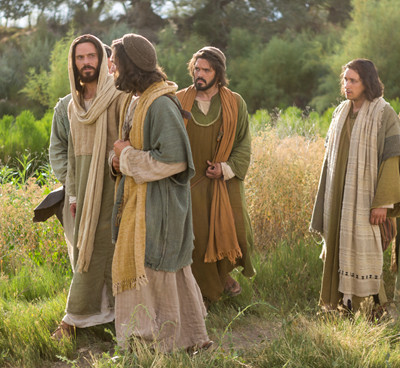On the road to Jerusalem Jesus asks his disciples two questions. The first is a general question. “Who do people say that I am?” The disciples respond with what people were saying about him. The popular notion was that Jesus was someone like John the Baptist, Elijah, or one of the great prophets. Then He asks, "but who do you say that I am?" Only Peter has the courage to answer.
 The answers to these questions go beyond mere excitement and enthusiasm. They touch the very makeup of the call to discipleship. Popular opinion is one thing. That’s not what Jesus was looking for. He wanted a more personal response, one that would not only come from the mind, but also from the heart -- an answer that would include total commitment to him and his ways.
The answers to these questions go beyond mere excitement and enthusiasm. They touch the very makeup of the call to discipleship. Popular opinion is one thing. That’s not what Jesus was looking for. He wanted a more personal response, one that would not only come from the mind, but also from the heart -- an answer that would include total commitment to him and his ways.
Peter answered “You are the Christ,” and he speaks for all of the disciples. It is the right answer. But their notion of a Messiah was a victorious ruler. It certainly did not include any notion of suffering. So, Jesus tells them not to tell anyone until they understand and learn what kind of Messiah he will reveal himself to be.
Peter would have none of this suffering business. He rebukes Jesus, perhaps telling Jesus that maybe this is the time to start spreading this good news. Jesus' answer to this was more than a rebuke, and said in not so gentle terms.
We can’t be too hard on the disciples. Jesus did not want to become a celebrity simply known only for his miraculous powers. It was too early in the formation of his disciples to have them spread word of his messiahship. They would have gotten the message all wrong. They would have missed what Jesus meant when he invited us to “take up your cross and follow me.”
It is encouraging to know that, though Peter completely misunderstood who Jesus was and what his mission to the world was, Jesus didn’t give up on him and the others and go looking for better candidates. The Gospel is suggesting that becoming a disciple is a process of growing in understanding. Peter’s quick answer seems correct, at first, but we learn the real answer is much more complex. Peter and the disciples will have to keep quiet for a while; they have more to learn. It is also obvious from what Jesus says to them at this stage of instruction: he is not going to be a quick fix for people’s problems.
Do you know who I am? Do you know me? Jesus' question is addressed to us now. And we, His followers answer readily, "You are the Christ. You are the Messiah. You are the Son of the Living God." But there is an implied crucial follow-up question as well: "How well do we know Him?"
We cannot just declare our faith in Jesus. If we don’t translate our faith into actions it means nothing and is not enough to save us.
“Who do you say I am?” is not a question that we need only to answer once in our lives. Our responses will vary, depending upon how we experience God's presence in our lives, and upon our own level of maturity and faith. The Gospel challenges us: Who is Jesus for us now and what is the meaning of Jesus for our lives now? It is important for us to take Jesus’ question seriously each day of our lives.





